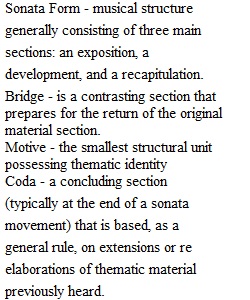


Q Study Guide — Classical 1. Know dates 2. Terms: sonata form bridge motive coda exposition development recapitulation theme and variations countermelody minuet and trio da capo scherzo serenade rondo sonata rondo symphony concerto cadenza fermata chamber music string quartet 3. Character of minuet 4. Rondo pattern 5. Order of movements in a sonata, concerto, string quartet and symphony (slow, fast, etc.) 6. Number of players in a symphony and string quartet 7. Classical concerto 8. Piano Sonata – what is the instrumentation 9. How did composers earn a living 10. Important geographic information for composers 11. Influence of folk music 12. Middle class 13. Movements in a symphony are partly unified by 14. Favored instrument 15. First movement in a classical concerto is 16. Chamber music is designed for 17. The piano trio is 18. Know major composers and # of their works 19. Know characteristics of each composers music (ex. personal life, career, music) 20. Mozart child prodigy on what instruments 21. Mozart's Don Giovanni, Requiem, German o era, 3 Italian opera 22. Beethoven's Ninth Sym., only opera, Third Symphony, and style periods 23. Beethoven expanded these sections of sonata form 24. Beethoven composed these works when totally deaf 25. Beethoven considered greatest music ever composed
View Related Questions